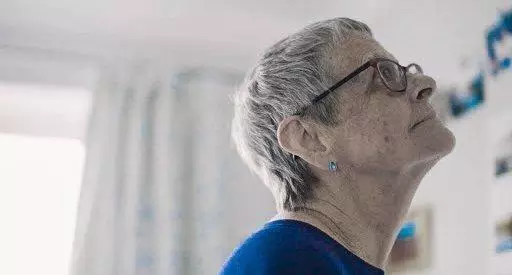Digital health should not be inspired by technology but by great people like Wendy Mitchell. When listening to health tech or innovation presentations they often use quotes by the likes of Steve Jobs, Reed Hastings who started Netflix, Joe Gebbia & Brian Chesky who started Airbnb or some other disruptive technology entrepreneur. However, we must never forget to have great people like Wendy Mitchell as our driving force, understand their lives, their hopes and fears and their everyday problems. Unsurprisingly this goes well beyond taking their medicine.

Picture of Wendy Mitchell from Youtube, uploaded by Alzheimer's Society UK
Wendy is a single mother of two daughters who in 2014 was diagnosed with early-onset dementia at the age of 58 years old. She has just recently published a memoir entitled ‘Somebody I used to Know’ and it is moving and inspiring account of one woman’s fight to regain control of her life. With help from her co-author Anna Wharton she charts the course of her illness from the first signs (a fall while out running that leaves her bleeding and ruminating that age may be telling her to slow down a little) to her being trapped inside her own mind ‘screaming to get out’. She tells this story with an honesty, warmth and humour that is truly inspiring.
“I have heard nothing from any doctor since my diagnosis three months ago. How can I help my daughters understand my diagnosis if I cannot understand it myself?”
Wendy was a highly efficient NHS manager who juggled rosters for hundreds of nurses, often keeping the information in her head so people described her as being like a machine. She now faced a power struggle between her own mind and body. She tells moving everyday stories of not being able to turn right in her car with someone angrily sounding their horn, to wearing earplugs to shield herself from normal street noise. One particular little battle to bake her favourite cake leaves her so frustrated she thinks to herself “I have heard nothing from any doctor since my diagnosis three months ago. How can I help my daughters understand my diagnosis if I cannot understand it myself?”
As described in the book the NHS abandoned her and she was forced to leave her job after dedicating 20 years Wendy decides to tackle her condition head on, to go into battle with her diagnosis. She educates herself demonstrating the digital reinvention of healthcare I have spoken about for the last ten years. She becomes highly knowledgeable with access to the world’s best information, she then starts a blog and joins Twitter, which she beautifully describes as ‘bringing the outside world back in’, giving her access to other people. This inspires her to become a spokeswoman for the Alzheimer’s Society. She fights for respect and hates the ‘term’ sufferer. Jargon like ‘Patient Engagement’ would make her laugh.
Instead she creates a memory room in her home filled with dated and described photographs from her life she uses to ‘outwit’ her disease by staring “at my photographs hard enough”
As she travels the country giving speeches she uses her iPad with photographs and maps, alarms set to remind her to eat, take her medication and even times alarms to tell her to get off the train and collect her suitcase. She calls this “scraping back control”. Small everyday problems solved, victories, no matter how small are the victories that maintain her control. Maintain her quality of life.
As she travels the country giving speeches she uses her iPad with photographs and maps, alarms set to remind her to eat, take her medication and even times alarms to tell her to get off the train and collect her suitcase. She calls this “scraping back control”.
This cycles me back to Reed Hastings from Netflix, or Joe Gebbia & Brian Chesky from Airbnb and the oft lauded world of digital disruption. This disruption is real but it comes from solving small problems. Reed famously came up with idea for Netflix when returning a long overdue video tape of the film Apollo VIII and getting a $40 fine. Surely there must be a better way to provide a home movie service than making a profit from fining often the best customers? The same with Joe and Brian, we have a large flat in San Francisco and can’t afford the rent, what if we rented out some air beds when the next big conference rolls into town? They both transformed their industries but they started with solving small problems.
Too often in healthcare the focus is on utilising jargon such as ‘activation’, ‘engagement’, ‘behavioural change’ or just selling an ‘app’ or ‘education programme’. This can hide organisationally defined objectives narrowly targeted at adherence and risk management without truly understanding the patient need.
There is some great work happening in dementia care with digital health. There are home sensors that can detect activity and extrapolate possible issues such as someone not having been in the kitchen to make themselves something to eat. Wearable technology can detect if someone has taken a fall and alarm systems can raise awareness if someone is in trouble. What about quality of life? What could replace Wendy’s iPad alarms and photographs helping her trick her disease?
Too often in healthcare the focus is on utilising jargon such as ‘activation’, ‘engagement’, ‘behavioural change’ or just selling an ‘app’ or ‘education programme’
There are fantastic solutions such as SimpleC, which uses IBM’s Watson’s artificial intelligence (AI) to support people with personalised programmes aimed at keeping people in their own home. It uses visual and auditory stimulation in what are called ‘stories’ that echo Wendy’s memory room. It is linked to family and carers and these personal stories remind the user to eat and take their medication-in a way that someone not as organised as Wendy can use.
There are chatbots like ElliQ and soft toys that are advanced interactive robots called PARO that can reduce stress, stimulate interaction and reduce the psychological impact on dementia patients. However, the future of mobile health combined with AI, sensors and the internet of things (IOT) is yet to be built.
Let’s focus on building that future and leave the jargon to the old world of patient support services.
You can listen to a discussion about jargon in digital health on the latest Digitally Sick Podcast
Useful links:
'Somebody I Used To Know' Wendy Mitchell
Wendy Mitchell's blog
Wendy Mitchell Twitter
SimpleC
ElliQ
PARO




Leave your comments
Post comment as a guest